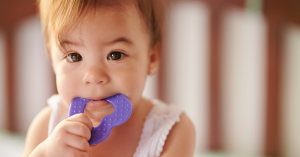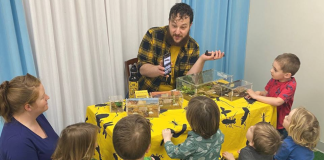So, your toddler has decided that biting seems like a great idea? That really stings!
But don’t worry, you are not alone. Almost ALL toddlers go through a biting phase.
It’s such a typical behavior that between the ages of 1 and 3, most toddlers will attempt to nibble on something or someone.
Maybe your tot is curious about cause and effect — they just HAVE to know what will happen when they sink their chompers into your arm — or perhaps they’re frustrated by another child at daycare.
The good news is that the biting phase, as frustrating as it can be, DOES NOT last forever.
For some kids, they stop biting almost as soon as they begin. After a few experimental nibbles, they lose interest and move on. But for others, they may choose to bite more regularly, or for a longer time.
So what can you do if the biting phase just won’t quit? And how can you put a stop to the behavior?
Before you can say sayonara to the biting phase, you must understand why and when your toddler chooses to use their teeth.
 Why do toddlers bite anyway?
Why do toddlers bite anyway?
Luckily, almost all toddlers (usually) bite for an identifiable reason. They could be communicating an unmet need, or coping with a situation or feeling they find challenging.
Your toddler may bite because…
They’re in pain
Many toddlers resort to biting at one time or another to soothe the pain from teething.
They are experimenting
Are you constantly fishing something out of your infant or young toddler’s mouth? Young children learn a lot by utilizing all of their senses, including taste! Your tot’s new affinity for nibbling on their surroundings (or playmates) could be their way of exploring the world.
They feel overstimulated
A new environment might seem just right to an adult, but to our young children, bright lights, loud sounds, or many new faces can quickly become overwhelming. If biting happens in new or chaotic situations, your toddler is telling you they’re overwhelmed.
They crave attention
Sometimes, even negative attention from caregivers seems like a better option to young children than getting no attention. Your tot could bite you or others because they are feeling ignored or crave more active play.
They lack language skills
It takes time for toddlers to learn how to express themselves with words. For younger toddlers who cannot yet identify their feelings, biting can appear as a sign of frustration or anger.
They have some other unmet need
Pay attention to when your tot bites. Is it always around the same time each day? They could feel overtired or hungry, but don’t know how to express that, so they resort to biting.
Even though biting is an embarrassing behavior for caregivers and painful for the one on the receiving end, toddler bites are rarely severe or require more than basic first aid.
How do I stop my toddler from biting?
I bet you’ve heard the age-old advice that the easiest and fastest way to stop infants or toddlers from biting again is to bite them back.
It makes sense. If you show your tot how it feels to be bitten, they are sure to stop and think before they sink their teeth into someone else, right?
Well, no.
This tactic rarely works as planned. Instead of encouraging empathy, you’re showing your tot that biting IS allowed when you’re upset or angry.
That definitely isn’t what you want!
To curb your tots’ next urge to bite, try these gentle methods to correct and discourage the behavior.
Identify the reason for the bite
Once you understand when and why your toddler bites, it is much easier to avoid situations that provoke a nibble.
Set firm boundaries
Enforce a strict “no biting” rule. Anytime your tot bites, you should respond with a calm, firm tone with explicit language. “No biting” or “No. Biting hurts” are a couple of phrases you can try.
Encourage using words to problem solve
Even when toddlers are too young to speak for themselves, it is helpful to identify their emotions together. If your tot is biting out of frustration or anger, try naming the emotion while you correct the behavior. “I see you are feeling frustrated. But we can not bite. Biting hurts”.
Keep a regular routine
Infants and toddlers need a routine to thrive. By keeping a regular schedule, with time for lots of active play, you can stop biting before it starts.
Redirect to another activity
If you notice your toddler is starting to feel some big feelings — like frustration or anger — it’s time to direct their attention to something new.
Reward positive behavior
As your toddler grows and begins to use words to express their feelings, it’s time to celebrate! Young children love praise and are likelier to repeat awarded behaviors.
Most importantly, remember to be patient with your tot and yourself. We all wish that our kids biting phase would disappear overnight. But that just isn’t realistic! It takes time for young children to master a new behavior.
Always remember that when you catch your child biting to keep your cool, repeat the boundary firmly in a calm voice — “We do not bite. Biting Hurts.” — and redirect their attention.
Over time, as your toddler grows and matures, the urge to bite will begin to subside. Even the most difficult tots should be over the biting phase by 3 to 3 ½ years old.
However, If your child is still biting well into the preschool years or begins to bite more frequently even with consistent correction, make sure to contact your pediatrician for guidance.
Sources:
“Toddlers and Biting: Finding the Right Response.” Zero To Three, Feb. 2016,
Weiss, Kerry. “Toddler Biting” What to Expect, 2 June 2022.
Watson, Stephanie. “Stop Children from Biting: Strategies and Tips for Parents.” WebMD, Oct. 2020.










